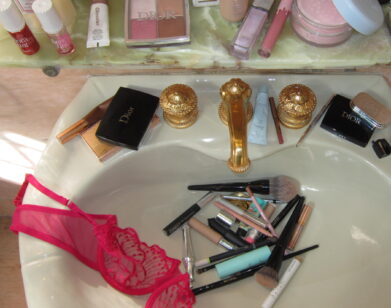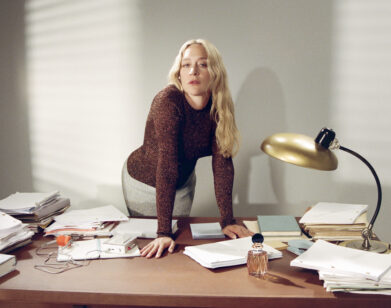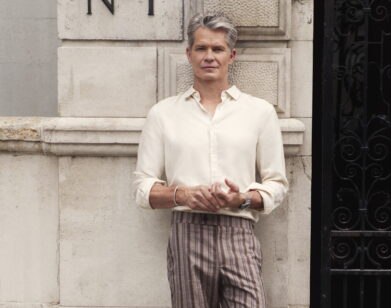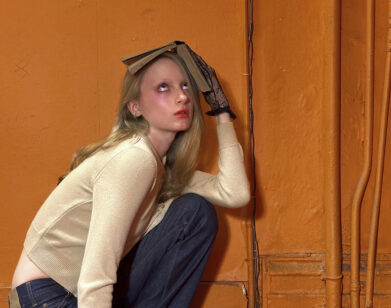CHARACTER
Tom Hollander on the Painful Sensitivity of Truman Capote
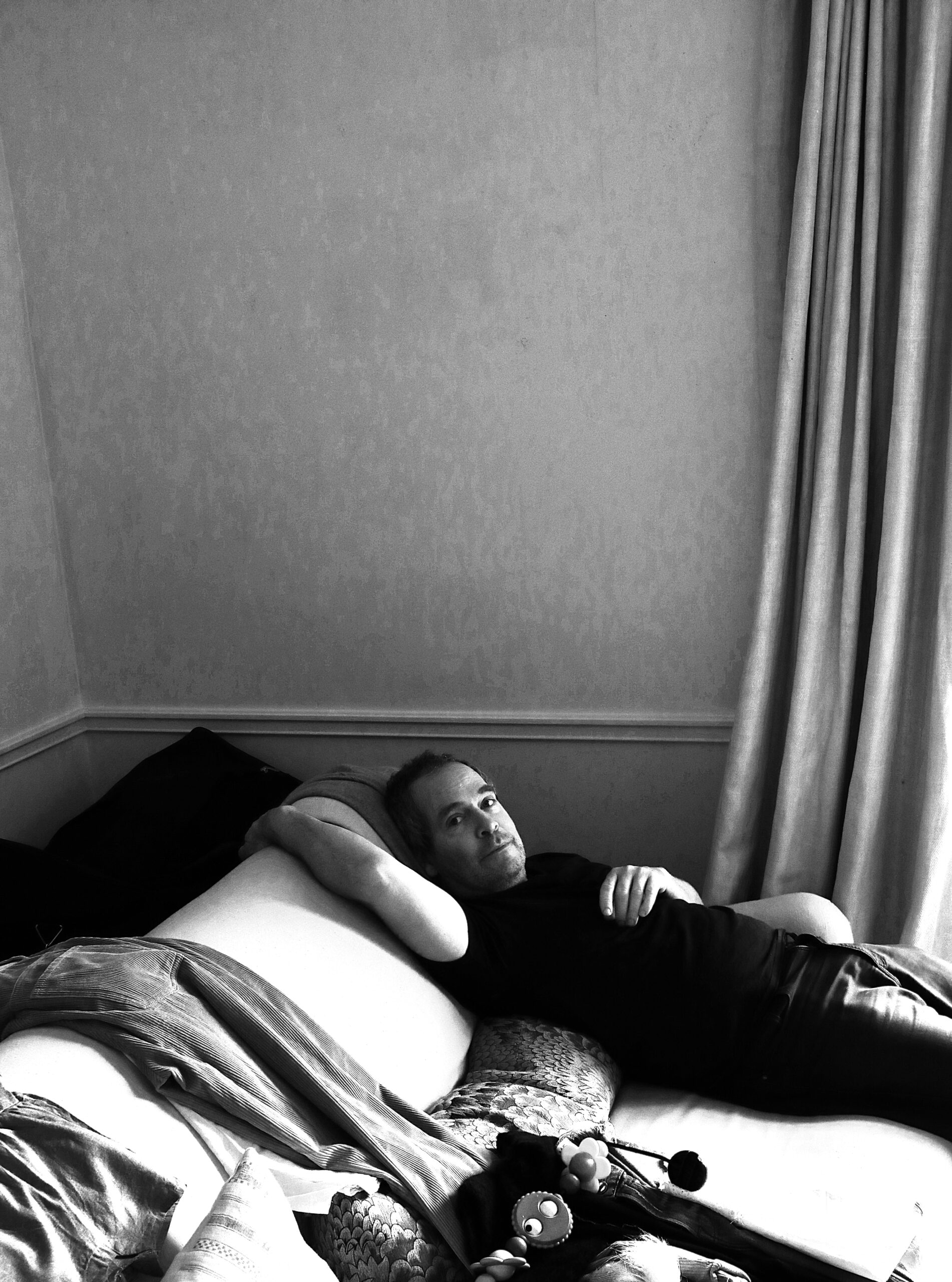
In Ryan Murphy’s latest FX series, “FEUD: Capote vs. The Swans,” director Gus Van Sant forgoes cinematic tropes in favor of a topsy turvy screenplay that echo’s the obsessive suffering of the infamous writer Truman Capote after losing his status in high society New York thanks to a damning Esquire piece in which he exposes the secrets of his powerful friends, a group of glamorous women he calls the Swans. Tom Hollander, who is perhaps best known as “the evil gay” in season two of The White Lotus, adopts Capote’s coy and conniving antics with ease, bringing out the late author’s loveable traits while simultaneously carrying the grief and suffering that motivated him. “The human feeling that he expresses in his writing, which is so fine and almost painfully sensitive, made me able to double down on his rage, and his self-destruction, and his depression.” Hollander says. “His persona and his whole Truman act, which he did more and more towards the end, is a huge defense thing.” Below, our senior editor Taylore Scarabelli calls up Hollander to find out how he uncovered Truman’s iconic voice, and what it was like to work with real life Hollywood Swans.
———
TOM HOLLANDER: Hello Taylore.
TAYLORE SCARABELLI: Hi. Thank you for joining.
HOLLANDER: I’m so sorry, I have to spend the first 10 or 15 minutes groveling with apologies for being so late.
SCARABELLI: Nine minutes late! That’s major diva Swan energy. [Laughs] I loved you in this role, I have to say.
HOLLANDER: Thank you.
SCARABELLI: Especially as the season progresses and Truman spirals further and further into chaos. I want to start by asking you how you prepared for it?
HOLLANDER: The technical aspect of the role was the most overwhelming daily thing. It’s a boring answer, but the hours spent learning the lines were enormous. If I had any time off, I would be walking around Washington Square Park with my noise canceling headphones on, muttering the lines to myself so that when I got to the set, I didn’t have to worry about it at all.
SCARABELLI: Do you find that memorizing the lines was a challenge because you were playing the lead, or because of how the dialogue was written?
HOLLANDER: Good point. The quality of the writing is such that it is wordy in the best possible way. Obviously Truman is a writer, so he speaks like a writer. But it was because it was so sustained. It was unrelenting for six months.
SCARABELLI: I wonder if your commitment to learning the lines comes from you being in the theater. Are television actors usually that committed to learning their lines?
HOLLANDER: Anyone would be in that role, and I was doing such an extreme voice. If it’s contemporary language, and you’re playing something very close to yourself, then you can sort of riff on it a bit more, but with this, that would not have been legitimate, because it’s so beautifully written, Jon Robin Baitz thought about every word. Eventually, I was able to improvise in the voice, but initially I had to know the words. I had to learn them like little bits of music.
SCARABELLI: For the readers of this conversation, Tom has a strong British accent. You sound nothing like this Capote character in real life, obviously. I was curious, were you reading a lot of his work while you were preparing for the show?
HOLLANDER: I didn’t have time. Fortunately, as a teenager, I read Other Voices, Other Rooms. And I’d read Breakfast at Tiffany’s a couple of times, and I’d read multiple short stories. I read In Cold Blood for this.
SCARABELLI: It’s interesting to think of how that could help you prepare, in terms of the rhythm of the dialogue.
HOLLANDER: How it helped me was that in this story, the drama is pretty dark, and Truman behaves in a pretty toxic way. Reading his writing really helped me commit to his toxicity, because the writing is so beautiful. The contrast between the sheer elegance and sensitivity of his sentence construction and the human feeling that he expresses in his writing, which is so fine and almost painfully sensitive, made me able to double down on his rage, and his self-destruction, and his depression, because you can feel the pain in the writing. Anyone who’s capable of writing that sensitively has to be experiencing a huge amount of pain.
SCARABELLI: Right.
HOLLANDER: His persona and his whole Truman act, which he did more and more towards the end, is a huge defense thing, I think. He was damaged and I don’t think he felt it was possible to ever feel whole. In the contemporary world, we talk a lot about our feelings, feeling our best, living our best life and our truth. That language was not really around then. People had to have other strategies for dealing with their pain, and he, by any contemporary standard, had dealt with an awful lot of it. He had a miserable childhood. I get the impression he was sexually assaulted a lot when he was at an all boys school in Greenwich. He was abandoned by his mother, didn’t really know his dad, and was living alone with one of his aunts, which he writes about so beautifully in the Christmas stories. It’s all coping mechanisms, writing was his estimable route out, and drugs and alcohol and sex were the less estimable versions, and that he succumbs to the last three, I think.
SCARABELLI: This series is really a story about addiction and codependency. What really got me was the way that you capture that initial high he gets before his downfall. You can really understand how the alcohol becomes a mask for Truman, and how that helps him become this person that he wishes he was, if only temporarily.
HOLLANDER: That’s right. I think he has that in common with all addicts. In the first episode, after the second or the third drink and a couple of pills, he goes, “What if I’ve lost the Truman that was capable of writing In Cold Blood, but after a couple of drinks and the right amount of pills, I do feel him right next to me and he’s still there.” It’s heartbreaking. I didn’t consciously prepare for that, but I’ve had quite a lot of experience with that stuff in my own life. I was thrilled to be telling that story because of people I’ve known, people I’ve been very close to. I’ve felt it in my own life at times, a propensity to get lost in the wrong things. A certain amount of research had already been done.
SCARABELLI: I think it’s really relatable with anyone who’s been close to or suffered from addiction. I was thinking particularly of one scene when he relapses, you see him and you instantly know that he’s drunk again. It’s so incredible how you’re able to signal these things so subtly.
HOLLANDER: It’s not just me. All of these things are collaborations, Gus Van Sant is choosing the take, because Gus knows this territory. He knows it deeply.
SCARABELLI: How was it working with Gus?
HOLLANDER: He made me very nervous at the beginning, because he doesn’t say very much. Some directors like to play god, but Gus doesn’t do that at all. Gus almost lets you forget that he’s there. At the beginning, when I was not confident, I was like, “What’s he thinking? He’s not saying anything. Oh my God, is it awful? Am I going to get fired?” But by the end, and when I say the end, I mean six whole months later, I loved working with him deeply because of the creative freedom that he allows and his eye and his understanding of what you are doing.
SCARABELLI: And how about those long shots?
HOLLANDER: He would dramatize what the actors were doing with the camera. He and Jason, the DOP, would spend up to an hour and a half working out a shot and lighting that would encompass the whole scene, so there could be one long continuous shot. Then you’d walk into it and the camera would move around as this extra character. Never did we do the conventional wide, mid, close, over the shoulder wide, mid, close. Gus was like a painter looking at a canvas, watching all of it.
SCARABELLI: And you enjoyed that?
HOLLANDER: I learned to love it and think, “This is what a truly great director is like.” There’s nothing for them to say, that if the thing has been cast appropriately and the writing is good. Their job is somehow to watch and react to what’s going on, and to make pictures out of it, which is what he did. I can’t speak of Gus highly enough. He’s painfully shy, which doesn’t present as sweet. It sometimes presents like a surly teenage boy.
SCARABELLI: [Laughs] How was it moving around in time while you were filming? As a viewer, you’re like, “Why are we jumping back and forth?” But by the end of the eight episodes, you feel as if you’ve experienced Truman’s obsession with rehashing the past, and it all comes together in this really neat way.
HOLLANDER: That doesn’t affect me as an actor, but I think if it works, then how brilliant is that? I did think, “Wow, this is the great age of television, this is a point where a writer and a producer know the boundaries of the medium, and they can go, “We’re going to tell the entire story in the first episode, and then we’re going to tell it again and again, and again.” As you’re suggesting, it sounds like memory, in the way that people go over the same events in their own lives.
SCARABELLI: I want to ask you about your relationships with the other actors on set. Who did you feel you had the most chemistry with?
HOLLANDER: Alexa Fogel, who is one of the masters of casting in American TV, had put together an astonishing cast, so every day I was working with great people. Obviously, the Swans are all icons themselves, icons cast to play icons, and they all have fascinating histories. Some days I felt like I’d won a competition to work with them, Diane, Naomi, Calista, Chloe. And Ella Betty, who was a natural, it was her first job. It was almost like a kaleidoscope of great female talent from Ella all the way to Jessica Lange. Jessica has been, as far as I can see, almost invisible in the press. Maybe Ryan wants to keep her as an astonishing secret weapon in the show. Acting with her was a big deal. In those scenes, she took control of the room in a way that affected the whole crew. She has a presence about her and an intensity, and she’s playing this cruel monster of a mom.
SCARABELLI: That must have been amazing.
HOLLANDER: It was. Ryan assembled this astonishing collection of people, and I was in the middle of it all. It was like I’d won a competition out of some sort of Wonka ticket. Actually, I looked like that in the pictures of the premier.
SCARABELLI: [Laughs] Do you feel like Truman, where you’re in the shadow of the Swans now during this press cycle?
HOLLANDER: I wonder if Truman felt like he was in the shadow of the Swans. I think on a good day, his ego was quite healthy. I think he probably thought he was doing them all a favor on some level. I don’t think he was above a little gentle misogyny himself. He was the great writer. They were the arm candy of plutocrats who he comforted. But at the end of the day, who’s going to be immortal?
SCARABELLI: Right.
HOLLANDER: But yes, me, the actor, in the context of these women, I was initially intimidated and pretty quickly just thrilled to go to work every day. They were all incredibly kind to me. Obviously Truman has betrayed them all, so there were difficult scenes, but it was a very healthy working relationship. He’s quite sweet to them all most of the time. It’s a platonic relationship, so there were little mini romances, but safe ones, friendship romances.
SCARABELLI: Sometimes those are really dangerous though, those friendship romances. I also think the relationships that this show explores between gay men and women are quite profound. There’s almost a competition within them. I don’t know to what extent Truman was able to be himself, to express his queer identity, and I think that’s part of the struggle.
HOLLANDER: I think he was able to be himself up to a point. His bitterness about what that point exactly was, comes out very, very articulately in the episode with James Baldwin, where he talks about exactly what his position was in the hierarchy, and how he’s one up from the staff. He’s an adornment on their table, and he’s great for a story, but they don’t really want to know about what it’s like being gay in a homophobic society. They don’t want to talk about that.
SCARABELLI: And that still happens today.
HOLLANDER: Of course. On the one hand, anything goes in high society because people are boundaryless, because they’re so rich, and they don’t have to suffer the consequences of what they do. On the other hand, there’s the conservatism of high society, it’s not progressive. I think you’d actually be surprised to the extent at which things still work on the same patterns. I’m just saying this in an interview with no evidence that’s shareable. [Laughs] But I think the old tropes of the patriarchy, they’re being eroded faster in the middle classes than they are in the very upper classes.
SCARABELLI: Oh, I believe it. Well, thank you so much for chatting with me.
HOLLANDER: Taylore, thank you for the lovely things that you said. I’m so happy to hear about the way the show works, the way that it affects you, and what it does with time. No one’s laid that out for me.
SCARABELLI: Will you watch it or you don’t like watching yourself?
HOLLANDER: I will eventually. Of course I will.

